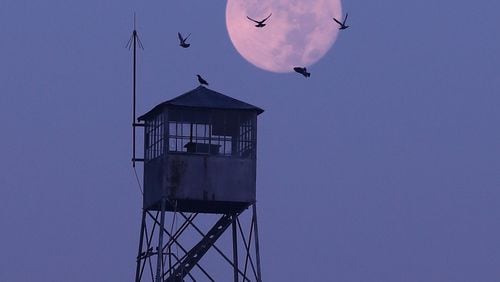Q: They said the supermoon will reappear in 2034, 18 years from now, but our recent supermoon took 69 years. Why the difference? Is there a reason for the time difference that we should be concerned about?
—Stanley Paja, Acworth
A: The supermoon on Nov. 14 was unusual because of its proximity to Earth while it was full.
That supermoon was only 221,524 miles from Earth, the closest it’s been since Jan. 26, 1948.
There isn’t a “simple rule of thumb” when it comes to supermoons, specifically a “super-supermoon,” like the one that was visible last month, Sebastien Lepine, an associate professor of physics and astronomy at Georgia State, told Q&A on the News in an email.
The next super-supermoon will occur, Lepine wrote, “when there is a coincidence between the phases of the moon (29.5-day period), the time of the perigee (27.5-day period), and the stretching of the moon’s orbit (180-day period).”
The perigee is the point at which the moon is closest to Earth.
“When you need a convergence of three different cycles, the patterns can be irregular, and this is why the number of years between two successive super-supermoons can vary,” Lepine wrote.
The moon has to be in a full phase to be a supermoon.
“There are many times when the moon is just as close to the Earth as during a supermoon, but when the moon is in crescent phase or quarter-moon phase, then it doesn’t count,” Lepine wrote.
There will be another supermoon on Dec. 16, according to NASA, but the moon won’t be as close to Earth as it was in November.
That won’t happen again until Nov. 25, 2034, according to NASA.
Andy Johnston with Fast Copy News Service wrote this column. Do you have a question? We’ll try to get the answer. Call 404-222-2002 or email q&a@ajc.com (include name, phone and city).






